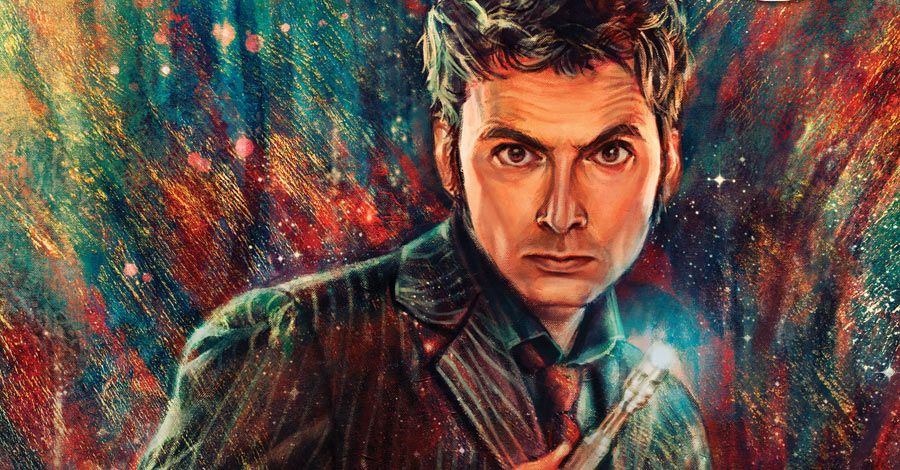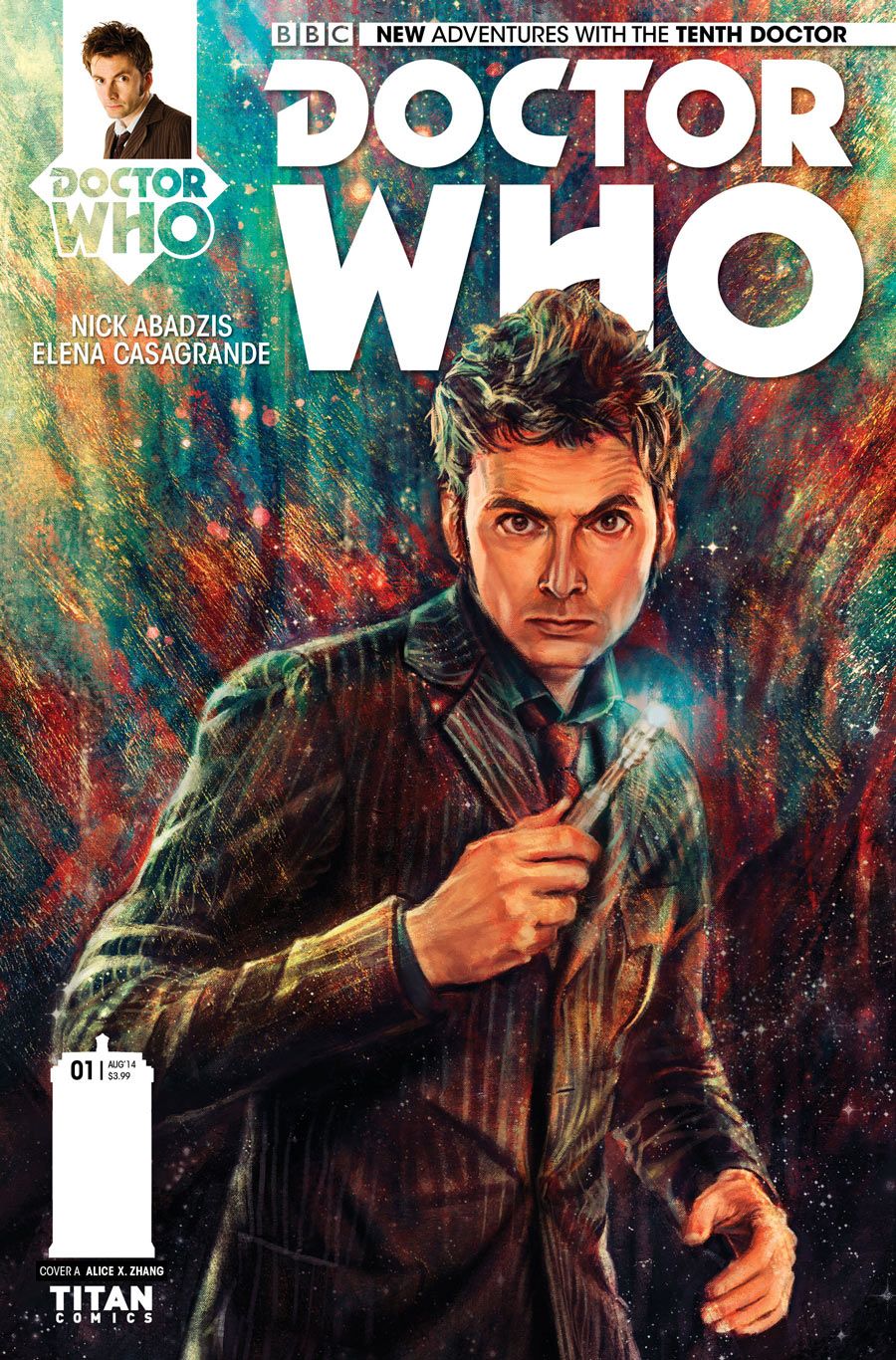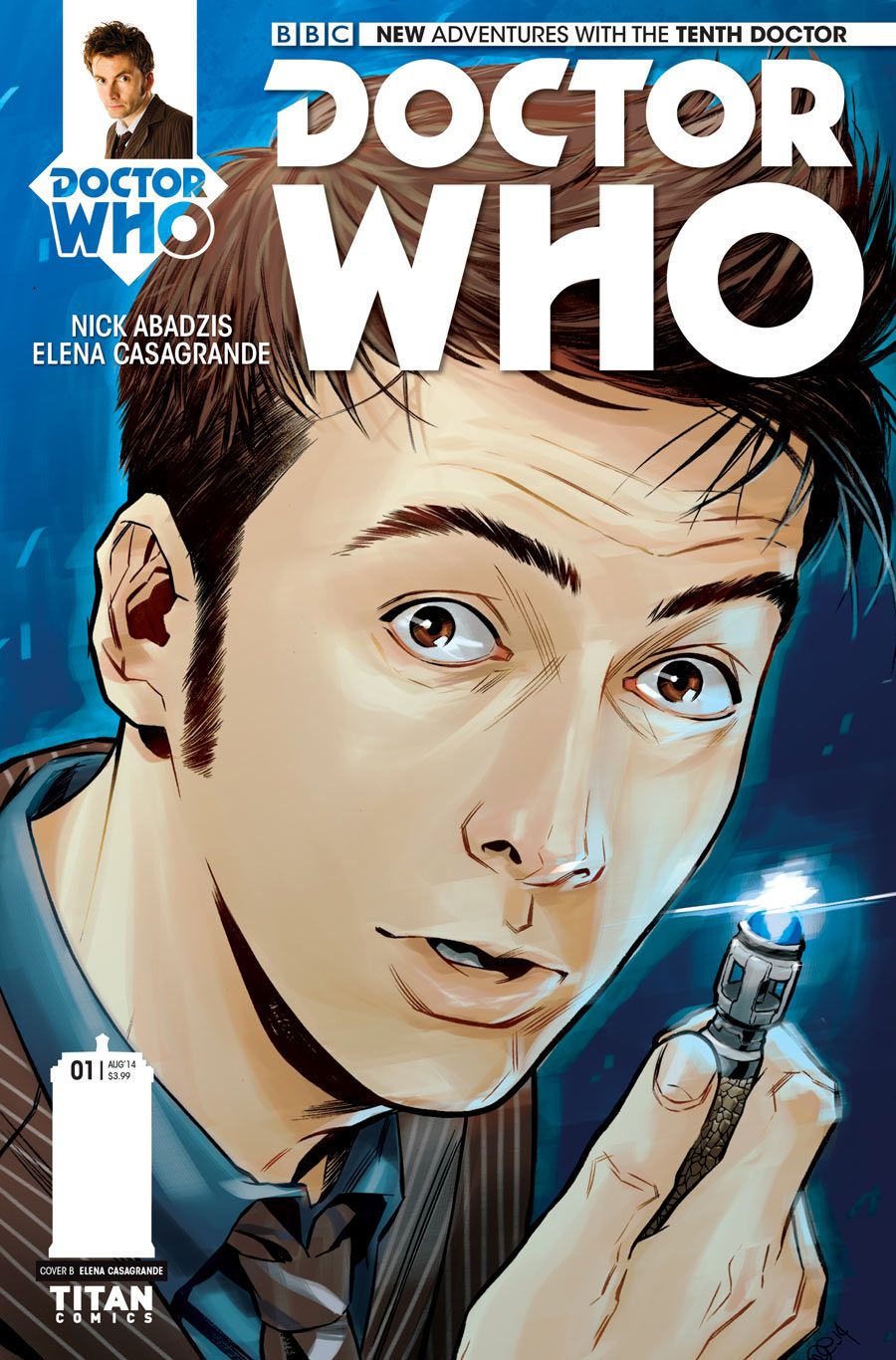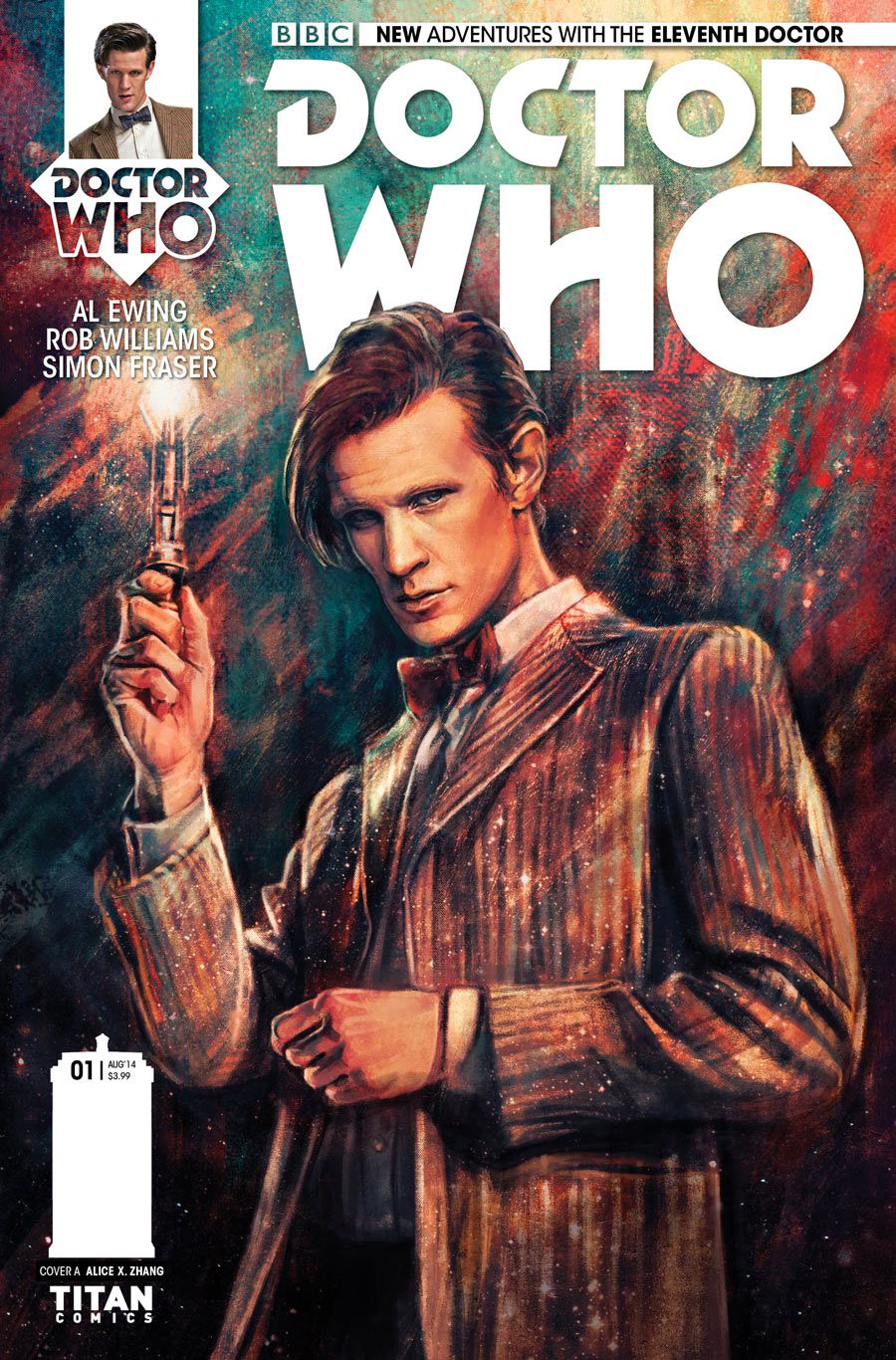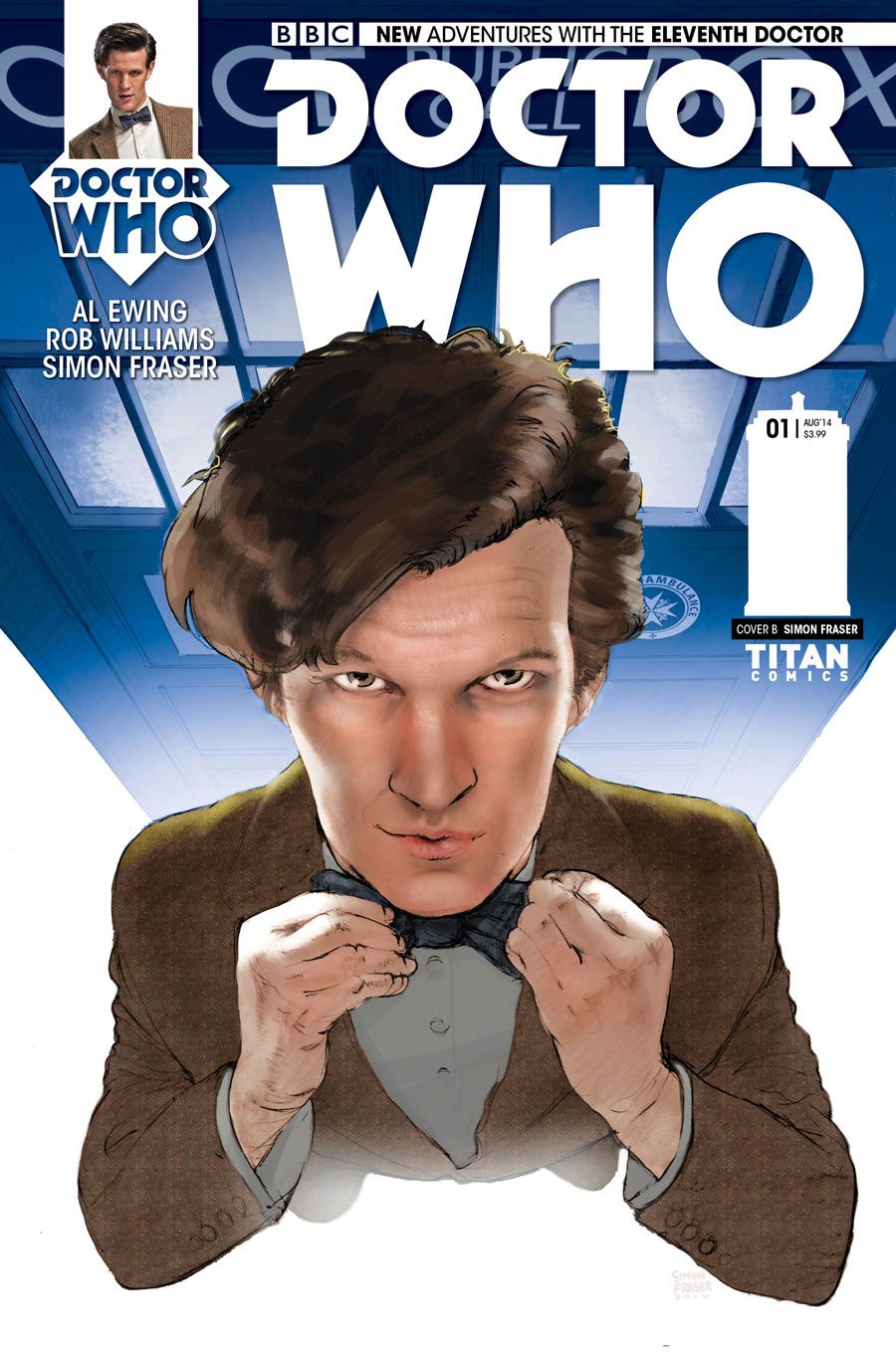Every few years, the Doctor regenerates into a new form, and so it is with his comic book incarnation as Titan Comics inherited the "Doctor Who" license from IDW earlier this year. Titan debuts the license this summer with two new ongoing series, "Doctor Who: The Tenth Doctor" and "Doctor Who: The Eleventh Doctor," featuring the adventures of the David Tennant and Matt Smith versions of the character, respectively.
RELATED: Titan Follows the Tenth & Eleventh Doctors in New "Doctor Who" Series
Nick Abadzis and Robbie Morrison, the writers behind the first two arcs of "Doctor Who: The Tenth Doctor," recently spoke with CBR News about taking over the iconic British franchise, revealing details on their first stories, sharing their mutual love of Tom Baker, explaining the origin of the Doctor's first American companion since Peri Brown and much more.
CBR News: Robbie, Nick -- how did you two manage to get handed the keys to the TARDIS for Titan's "Doctor Who?"
Nick Abadzis: I was asked at the end of NYCC 2013. I met with my old friend Steve White of Titan Comics -- we worked together years ago as editors at Marvel UK, back when Marvel had a UK office. He knows I am a lifelong "Doctor Who" fan, so he broached the idea to me. I'd written the tenth Doctor briefly before, for Britain's "Doctor Who Magazine," before I'd even seen David Tennant in the role on TV -- it was his comic strip debut. He became one of my favorite Doctors, so the opportunity to do more with the character was irresistible.
Robbie Morrison: Seeing as we're dealing with "Doctor Who," I have to say it was good timing, in fact it was a sort of early Christmas present. Andrew James and Steve White contacted me in December last year with the news that Titan Comics had acquired the "Doctor Who" licence and asked if I fancied writing some stories for it.
The Doctor, along with the likes of Sherlock Holmes and James Bond, has become one of the iconic British fictional characters. I was a huge fan of the show when I was a kid and jumped at the chance to create some new adventures in time and space. Also, I was impressed with Titan's plans to release not one, not two, but three ongoing series starring the most recent incarnations of the Doctor. I liked that they were being ambitious and going for it in a big way.
What are your respective arcs about? Where do your stories pick up with the Tenth Doctor?
Abadzis: In the first issue, the Tenth Doctor finds himself in Sunset Park, Brooklyn, New York City. It's just before Halloween, and also the Mexican Day of the Dead festival. He's investigating an alien incursion, as you'd expect. I don't want to give too much away about the alien threat, but they're nasty, and they begin terrorizing the local population, many of whom happen to be Mexican in origin. It's also the introductory story for our new companion, Gabriella Gonzalez, so issue one is basically about how she meets the Doctor for the first time, and why. From there, of course, the threat escalates.
Morrison: My first storyline takes the Doctor & his new companion Gabby to one of the darkest periods of human history -- though also one that's quite timely at the moment -- to face an enemy so terrifying that I'm actually a wee bit scared to start writing the scripts. I don't want to go into too much detail right now, as my first arc doesn't start until issue #6, which is ages away unless you've got your own TARDIS.
Also, I've just finished reading Nick's first script and he's got some fantastic stuff lined up before then -- not least the introduction of Gabriella Gonzalez, the Doctor's new companion.
Tell us a little more about Gabriella. Who is she and how did you develop her character?
Morrison: Nick -- and Elena, of course -- have done the majority of the work in developing Gabby, so I'll let him do the introductions. Even before we discussed it, I think everyone had already decided that -- partly because the series is aimed at the US market -- the new companion should be American. Nick suggested that she be Mexican-American & based in NYC, which sounded good to me. As he's based in NYC & lives near Gabby's neighbourhood of Sunset Park, it made sense to let him run with it.
Coincidentally, the last conversation I had with Nick before he moved to New York was about the Doctor and how we would tackle the character. Who knew that, a few years later, we'd have our bluff called and actually be working together on it?
Abadzis: We all had input into the creation of the new companion, but I was doing a thing I do whenever I embark upon a new project, which is walk or ride my bike a lot, and think. Andrew, Robbie and I had already all agreed that this new companion should be from New York, but one day I found myself in Sunset Park (I live nearby) and it hit me like a thunderbolt that she should be Mexican-American -- the Doctor's never had a Hispanic or Latino companion (to our knowledge). The story for the first arc and the nature of the companion all kind of came together very rapidly, and you know you're always onto a good thing if characters present themselves to you in that way. It's very organic and you can already hear the cadences of their voice and so on. It just felt like a character like this would work with the tenth Doctor. Happily, once I'd outlined the general plans for my story, Andrew and Robbie agreed, and Gabriella was born.
Like Rose, Martha and Donna, she has a family, who each play a part in her first story, so there is some initial emphasis placed upon those scenes. I took a leaf out of Russell T. Davies' book and wrote the first issue from her point of view.
But ultimately, the stories are about the Doctor and his companion. You can't change the Doctor really, he is what he is. He's a traveler in the universe, the ultimate cosmopolitan and that's what fascinates us -- but you can show cool new things about him, how he reacts in different situations and to different kinds of characters or civilizations or threats. So, to a certain extent, Gabby is designed to bring out new facets of the tenth Doctor's character, reveal nuances in him by, hopefully, being nuanced herself.
Nick, why did you decide to set the first arc in America? And an American companion to boot!
Abadzis: Both my editors at Titan, Andrew James and Steve White, expressed ideas that the companion might be American, but that's how I was already thinking anyway. A new companion could be from anywhere of course, but this seemed obvious and sometimes you shouldn't overlook the obvious if it serves one's own writerly purposes. Obviously, the Doctor's had an American companion before -- Peri Brown -- but not recently. I'm British, but I live in New York City, one of the most cosmopolitan places on Earth, so it made sense to me that she be a New Yorker. From a thematic point of view, Gabriella has things in common with some of the previous tenth Doctor companions, but she comes from a very different background.
New York's a great setting for a "Doctor Who" story; obviously it's a city I love, it's my home, and in canonical terms it has a certain talismanic quality for the Tenth Doctor ("There are versions of this city throughout history") so I wanted to bring some of that to Gabby's introductory story too. The story mostly takes place in a part of the city the Doctor's not been seen to visit before though, and that too has a bearing on events.
Will the arcs for this book jump around the Tenth Doctor's entire existence or will they be chronological?
Morrison: They're chronological for the most part, as they're telling the story of Gabby's time as what could almost be described as the Doctor's 'secret' companion, the one we didn't know about until now. The reasons why we haven't encountered her so far may even have some deeper significance as the series unfolds. Who knows. Or does he?
And, of course, with a Time Lord as your lead character, flash-backs, flash-forwards & even flash-sideways can't be ruled out. I agree with Nick in that I feel each incarnation of the Doctor has had a bigger, longer life than what we've seen on TV, or in books & comics. As far as I'm concerned, there's a lot we don't know about the Doctor -- in all his guises -- & makes him an even more intriguing character.
What's your process for getting into the head of the Doctor?
Abadzis: Can you get into the head of the Doctor? You can get his cadences, illuminate his brilliance, his sense of curiosity and adventure, of fun and of romance and you can demonstrate his heroism. He has emotional qualities, of course, he thinks everyone is important, he's very compassionate but in some ways he's also the ultimate loner. Ultimately you have to remember that he's an alien with perceptions of the universe that are very different to ours. You show what he's like, what's in his head by showing his reactions to others, to his companions, his adversaries, his allies. You've got to think in a completely original and offbeat way -- like he does.
Morrison: I strolled around town in a curly wig, wide-brimmed hat and multi-colored scarf that I keep tripping over, offering jelly babies to people and attempting to open doors with a sonic screwdriver made out of an egg-whisk, a cork-screw & an elastic-band. And I promise that I'll get straight back onto writing scripts once they let me out of this padded cell.
Seriously, in practical terms I've been re-familiarizing myself with the Doctor's most recent incarnations. In terms of getting into the character's head, I think the key is optimism, curiosity, dogged determination, a sense of doing what's right and an indefatigable will to never give up despite the odds, all wrapped up with a generous helping of British eccentricity and humour.
I've written a lot of hard-bitten anti-heroes and self-destructive hell-raisers, but what I like about the Doctor is that, despite all the monsters and horrors he has faced, he has never abandoned his faith in the potential of the human race - and the universe in general -- to become something wonderful.
What makes David Tennant's Doctor stand out from the pack?
Abadzis: I personally very much enjoyed David Tennant's portrayal of the Doctor -- well, let's not be coy about this -- I loved it, I loved the wounded, impassioned quality he brought to the role. His is one of the most human portrayals of the part; there was a complexity and romanticism to it that I know I'm not alone in finding very appealing.
Morrison: Well, he's quite tall, especially with that sticky-up hair. No, Tennant's Doctor is one of the most 'human' that we've seen -- warmer and more compassionate than some of his predecessors, romantic even. That makes him very easy to relate to, whereas in the past, human companions were sometimes an emotional conduit to colder, sterner, more 'alien' Doctors. He also gave the Doctor a swashbuckling flourish, which is very appealing.
And, if I remember correctly, David Tennant's from Paisley, in Scotland, which is very close to where I grew up.
Who are your personal favorite Doctors?
Abadzis: I love 'em all, I really do, Peter Cushing included. They're all different, all splendid in their own ways. Tom Baker is "my" Doctor, the one I grew up with and who will always have a special place in my heart. I can watch Patrick Troughton forever -- his performance as the Doctor was so layered. Paul McGann's Eighth Doctor kept me going through the wilderness years when there was no Doctor Who on TV, but he was there in novels and audios so he was the image of the Doctor that I had I my head for a very long time. More recently, Tennant really blew me away. His Doctor has a raw, emotional quality that I love. Smith's incarnation is wonderfully alien, ancient and childlike at the same time.
Morrison: My Doctors are Jon Pertwee and Tom Baker, with a slight bias towards Baker. I think the Doctors you watch in your youth are probably the ones that have make the most lasting impression. My first memories of the show are of Pertwee strutting his velvet-jacketed stuff and dispatching aliens with Venusian karate, though I could only have been a couple of years old at the time.
I actually remember being mighty peeved when Pertwee regenerated, as the Fourth Doctor was less of an action man and more of an outlandish eccentric, but Baker quickly won me over. Mention Doctor Who to me and he's who I immediately see in my head. Don't worry, though, the Tenth Doctor won't be strolling about the comic in a curly wig and long scarf.
When I lived in London, I sometimes used to see Tom Baker in the local Marks & Spencer's, which was a suitably surreal experience. I got quite blase about it, but my younger self would've followed him home to see if he got into a big blue telephone box...
Why do you think "Doctor Who" has exploded into mainstream America pop culture in the last two or three years? It certainly took a while!
Abadzis: The time was right. Tom Baker's incarnation was embraced here in the '70s and early '80s when his stories aired on many PBS stations, so ever since then there's been a bedrock of fans. But now he's been discovered and embraced by a new generation and I think it's because he's a hero of the time -- he's hugely relevant. The Doctor is essentially fiction's greatest cosmopolitan -- he tours the universe, sometimes with friends, sometimes on the run, sometimes not, but always with curiosity, respect, optimism and a huge sense of fun. He's all-embracing, open-minded in a way that celebrates life. You need him in yours!
Morrison: Hey, quality always shines through, eventually. And it didn't really take all that long if you measure things in Time Lord Years.
"Doctor Who: The Tenth Doctor" is out this July from Titan Comics.

